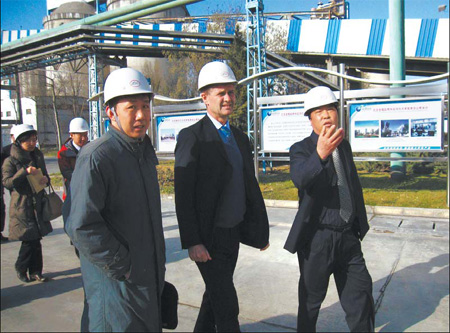China and Norway eye closer eco-partnership
Minister hails China as future eco-leader
By Wang Danna (China Daily)
Updated: 2009-12-23 07:57
 |
Large Medium Small |
|
Norway's Minister of Development and Environment, Erik Solheim (middle), pays a guided tour of the Beijing Jinyu Mangrove Environmental Protection Technology Co Ltd during a recent fact-finding mission to the company's facilities. Wang Danna |
Cooperation on climate change, environmental protection and energy saving initiatives has long underpinned the on-going dialogue between China and Norway and has become the bedrock of their bilateral relations. In an exclusive interview with China Daily, Norway's Minister of Development and Environment, Erik Solheim, a frequent visitor to China, lays bare the unique relationship between these two very different countries.
In accordance with the Norwegian Action Plan For the Environment and Development Cooperation, the two countries have recently intensified their joint efforts in the environment, energy and climate change sectors.
On September 18, 2006, the two countries signed an agreement to work together on a project related to the environmentally sound management of hazardous and industrial wastes in cement kilns throughout China. This three-year project is now coming to an end and has successfully boosted the technological development of resources for the disposal of the hazardous and industrial waste co-processed in cement kilns across the country.
During a one-day visit to China, the minister took a guided tour of the Beijing Jinyu Mangrove Environmental Protection Technology Co Ltd, one of the largest professional industrial waste disposal plants in China. It is also one of the pilot plants chosen to provide firsthand information for refining the relevant technologies.
When asked why the plant was the first stop on his itinerary, the minister said: "The plant is an excellent example of Sino-Norwegian cooperation. It is an impressive example of how much can be achieved in terms of introducing environmentally friendly technology to the cement industry."
At present, the whole world is united in a global bid to reduce energy consumption and CO2 emission. In light of this, the Norwegian minister believes co-operation between the two countries represents a "very positive win-win situation." He said: "I very much hope that this plant will set an example to others in the Chinese cement industry".
Commenting on the significance of the project, Solheim said: "If these technologies are introduced to more and more factories, not only in China but throughout the world, this will enormously reduce overall emissions and particularly those emanating from the cement industry.
"I believe that technological change is the most important solution to climate change. China is now on the way to still greater economic development and I hope that it will happen in an environmentally friendly way. China is at a crossroads and is opting to become more eco-friendly and to support low carbon growth. In a few years time, I believe China will be a leader in many environmentally friendly technological fields."
Despite the minister's belief that increased international trade and global economic development accelerates climate change, he maintains that shouldn't hamper future growth. He said: "We shouldn't be slowing down international trade whilst there are still so many people living below the poverty line across the world."
Rather than abandoning growth initiatives, the minister believes that countries should embrace ecologically-sound development regimes and seek new technologies that reduce both energy consumption and emission levels.
He said: "Cooperation on climate change and environmental protection should not just be at a government level. Everyone should be responsible for the environment. Everybody needs to be aware of their own responsibility." More and more people agree that this is especially important in China, a country with population of over 1.3 billion.
Solheim cites the example of his own country, where people are now expected to recycle household waste on daily basis and where the government actively encourages people to use public transport rather than cars. In the near future, according to the minister, Norway's roads will also welcome a new generation of mass production, environmentally-friendly electric cars.
He believes the people of Norway and China are united in their strong desire to take care of the environment. He said: "People now understand every generation is duty bound to hand over the planet to the next generation in the same or better state as when they took responsibility for it. No generation has the right to destroy the planet for the next generation."
The efforts to secure an ecologically-sound planet are not restricted to just governments or individuals. Solheim said: "There are two ways to protect the environment. Governments should take the lead position, but pressure groups and environmental organizations should continuously remind politicians of their responsibilities regarding this issue.
"It is the same in China as in the world over. People in Beijing are very concerned about pollution. This will put pressure on politicians to react to the current situation. More and more people in China are now campaigning for a low-carbon life-style and a low-carbon economy. This will result in greater efforts being made to meet this citizen-set agenda.
"The Chinese government announced recently that it had set a target of reducing greenhouse gas emissions by 2020, relative to economic development. This will see it aim to reduce the carbon intensity by 40 to 45 percent, compared to that of 2005. This is a very positive measure and very encouraging for the future."
(China Daily 12/23/2009 page12)








